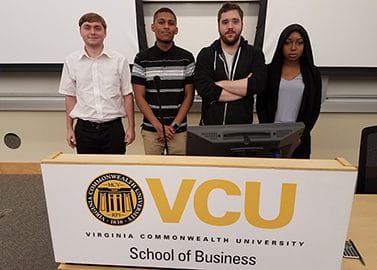We have interviewed Baird Connor, Daughtey Benjamin, Goodwin Declan, Pearson Sean and Westry Najiyah of Funday Bike Parade (pictured above) from Virginia Commonwealth University who landed the Number 1 spot in the Top 20 MikesBikes Intro Hall of Fame.
In this interview, the team provides insight into their strategy, the tools they used to help develop their winning strategy and what they think of the simulation.
What is your decision making process within the simulation?
The decision-making process begins with checking the situation in the market. If you’re behind, the rest of the production and advertising decisions work mostly in response to other firms’ actions; if you’re ahead of the game, however, you have a lot more freedom to focus on nothing but maximizing income. Generally, we usually consider new products and developments, then possible changes to capacity and production, then possible changes to advertising, then financing and equity options.
What was your strategy going into the simulation?
The strategy from the very start was to try to dominate every market as soon as possible, to suck the competition dry and reach for a high SHV.
How did you begin implementing that strategy?
Astronomically high advertising budgets (or PR, in the case of road bikes) from the start, every time, targeted toward the most efficient audiences. Penetration pricing to help steal even more sales from the competition. New products as soon as possible, every time, to try to dominate the newer markets quickly. For example, when they became available, we immediately jumped at road bikes; our share in that market never fell below 80%.
How did you familiarize yourself with the simulation?
We played with the single player version for a few hours, trying out different strategies and generally discovering how the game worked and how each variable interacted with the others. We would even try rollovers with only one or two variables changed in order to find out the most optimal choices.
How would you describe the competition?
I believe that the competition did not take the same initiative in familiarizing themselves with the game, and so they were blindsided by their lack of market share after the first rollover. After one or two more rollovers, the market had shifted too much in our favor for them to recover very effectively.
What resources did you pull on to develop your winning strategy which led you to be a part of the MikesBikes Introduction Hall of Fame?
We used information from the guides and internet, along with all of the market information given in the simulation (for example, advertising effectiveness and bike-specific preferences). We also used the rough numbers from the first couple weeks to come to the decision that domination on all fronts is the best strategy.
What challenges did you face? How did you overcome these?
Decisions were difficult in the early stages because everyone started off on even footing, and each new decision option was mostly mysterious at the start. However, with experience, practice rollovers, deep experimentation, and dedication, we isolated the variables and won.
Was there anything in particular you did that you think helped to prepare yourself?
Offline rollovers are any player’s best friend, at any stage of the game.
How has participating within a course which uses a business simulation to supplement their teaching materials helped you? What do you think of the business simulation?
It gave a lot more context to the lessons, making them easier and more intuitive to understand. Often, lectures would include references to the current events in MikesBikes, which made them more engaging.
Comments on your experience with the simulation itself
Playing the simulation was a great, useful experience because it gave us the opportunity to look at the basics of the simulation and deconstruct the game in a classroom/team setting. Of all the things that we’ve had to pay for in each class, this was probably the most worthwhile expense.
